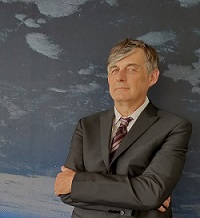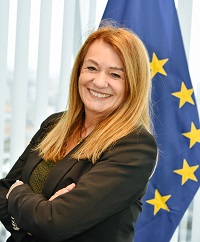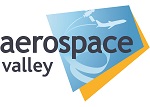KEYNOTE SPEAKERS
DR ,ING. HABIL. MARIO TRAPP, FRAUNHOFER INSTITUTE FOR COGNITIVE SYSTEMS IKS, GERMANY
Tuesday 11 June, 2024 - 10:30 - 11:00 AM - Auditorium

Biography :
Prof. Mario Trapp is Executive Director of the Fraunhofer Institute for Cognitive Systems IKS. In 2005, he obtained his PhD from TU Kaiserslautern, where he also did his habilitation in 2016. He also joined Fraunhofer IESE in 2005, where he started off as a head of department in safety-critical software before becoming head of the Embedded Systems division from 2009 to 2017. After being appointed Acting Executive Director of Fraunhofer ESK (now Fraunhofer IKS) in Munich on January 1, 2018, he assumed this role on a permanent basis on May 1, 2019. In addition to this, Mario Trapp has been a Full Professor at the Technical University of Munich (TUM) since June 1, 2022. He is the Resident Professor for Engineering Resilient Cognitive Systems at the School of Computation, Information and Technology CIT. Prior to this, he taught as an Adjunct Professor in the Department of Computer Science at the TU Kaiserslautern. For many years, Mario Trapp has been contributing his expertise to the development of innovative embedded systems in the context of successful partner projects, in cooperation with both leading international corporations and small and medium-sized enterprises. Currently, his personal research focus is safety assurance and resilience for cognitive systems, which form the technological basis of many future scenarios such as Industrie 4.0 and automated driving. Mario Trapp has authored numerous international scientific publications. He is also a member of the Bavarian State Government’s Council on AI (Bayerischen KI-Rat) and the Bavarian State Ministry of Economic Affairs, Regional Development and Energy’s AI — Data Science (KI — Data Science) expert panel.
Presentation title : Resilience Revisited - Assuring Safety in the Face of the Unpredictable
Abstract: Venturing into the world of autonomous systems, this talk explores the intricacies and challenges of assuring safety in a realm where, as 19th-century philosopher William James put it, “the world is a blooming, buzzing confusion.” The spotlight is on learning-enabled autonomous systems, a domain facing urgent safety challenges in our rapidly advancing technological landscape.
The presentation revisits the concept of resilience, opening up a vital discussion on the necessity of safety in the face of unpredictability. It lays out the current challenges with a keen eye on the complex balance between system utility and safety. Potential solutions are proposed, providing thought-provoking insights into how we can enable these systems to adapt themselves to diverse contexts without compromising their safety. This talk takes you on a journey into the heart of self-adapting, resilient systems, exploring their complexities, their potential, and their critical role in our future. It's a riveting exploration of a new generation of systems that continuously adapt to meet the unpredictable challenges of the world around them.
Based on pertinent examples and current research, this talk not only delves into the dynamics of learning-enabled systems and their safety assurance but also underscores the challenges that remain to be addressed, thereby shedding light on these systems' promising future potential.
Christophe Honvault, ESA/ESTEC, THE NETHERLANDS
Wednesday 12 June, 2024 - 09:00 - 10:00 AM - Auditorium


Biography
Christophe Honvault is responsible of the Software Technology section in the Software Systems division at ESA/ESTEC. He is leading a team of experts in the domain of new technologies to evaluate their use in the domain of the division, i.e. the development of space software and their ground software support. The list of technologies that are currently evaluated are related to Requirements engineering (Ontology), data modelling and specification, formal methods, Big Data, Cybersecurity, Quantum Computing and of course all the numerous applications of Artificial Intelligence. He is the lead of the Avionics Competency Domain at ESA and convenor of the ECSS Software standard (ECSS-E-ST-40C).
Presentation title : The 5 Ws and 1 H of autonomous space systems
Abstract :
The performance of first processors used in space was limited as well as the amount of their memory. Only critical functions were implemented and all operations were planned on ground by operators. In the last three decades, the evolution of space processor capabilities has been very significant, growing from one to several hundred million operations per second allowing an increase of the number and complexity of functions that can be executed on-board. Nevertheless, the change in mentality of institutional customers, operators and project managers is taking time, slowing down the introduction of autonomy concepts and functions in space systems.
In this keynote, we present the evolution of space systems from automation to autonomy. We then address the benefits and challenges of the introduction of autonomy in critical space systems by proposing some solutions with concrete examples to the five W questions. Why implementing autonomy in space systems? When can a space system benefit from being autonomous? Who benefits from autonomous space systems? Where to implement autonomy? What are the current technologies and architectures? As a conclusion, we suggest some actions on How to achieve a dependable critical autonomous space system.
Lucilla Sioli, Director for Artificial Intelligence and Digital Industry, European Commission
Wednesday 12 June, 2024 - 11:30 - 12:30 AM - Auditorium

Biography
Ms Lucilla Sioli is the Director for "Artificial Intelligence and Digital Industry" within Directorate-General CONNECT at the European Commission. She is responsible for the coordination of the European digitisation of industry strategy and for policy development in the areas of artificial intelligence (AI) and semiconductors, including regulatory approaches such as the AI Act and the Chips Act. The directorate also supports R&D&I in key digital industrial technologies including microelectronics, photonics, robotics and AI. Lucilla holds a PhD in economics from the University of Southampton (UK) and one from the Catholic University of Milan (Italy) and has been a civil servant with the European Commission since 1997.
Presentation title : TBC
Abstract : TBC
ORGANISED BY

ERTS - IMPORTANT DATES
Abstract of Regular &
Short Paper submission (4 pages) : October 15th, 2023, November 26th, 2023
Acceptance Notification : February 8th, 2024
Call for nomination : ERTS 2024 PhD
Dissertation Award on Embedded critical computing Systems : March, 15th, 2024
Regular Paper for review (10 pages) : April 3rd, 2024
Final Paper (Short and Regular) : May 5th, 2024
Registration end of early bird rate : May 15th , 2024
Congress (new dates): June 11th to 12th, 2024
sponsors
partners






